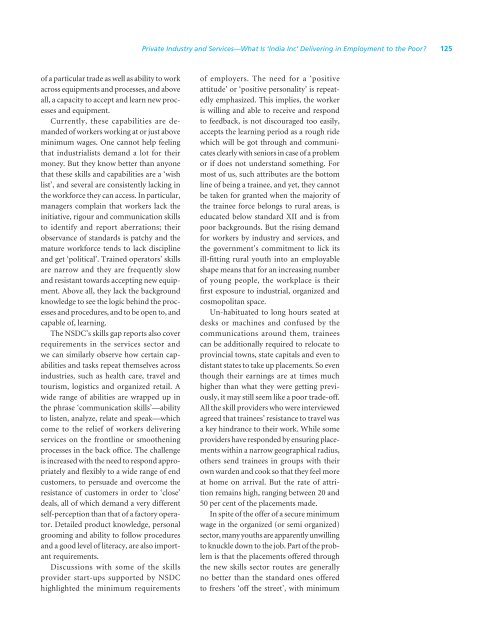SOIL Report 2011 - ACCESS Development Services
SOIL Report 2011 - ACCESS Development Services
SOIL Report 2011 - ACCESS Development Services
- No tags were found...
You also want an ePaper? Increase the reach of your titles
YUMPU automatically turns print PDFs into web optimized ePapers that Google loves.
Private Industry and <strong>Services</strong>—What Is ‘India Inc’ Delivering in Employment to the Poor? 125of a particular trade as well as ability to workacross equipments and processes, and aboveall, a capacity to accept and learn new processesand equipment.Currently, these capabilities are demandedof workers working at or just aboveminimum wages. One cannot help feelingthat industrialists demand a lot for theirmoney. But they know better than anyonethat these skills and capabilities are a ‘wishlist’, and several are consistently lacking inthe workforce they can access. In particular,managers complain that workers lack theinitiative, rigour and communication skillsto identify and report aberrations; theirobservance of standards is patchy and themature workforce tends to lack disciplineand get ‘political’. Trained operators’ skillsare narrow and they are frequently slowand resistant towards accepting new equipment.Above all, they lack the backgroundknowledge to see the logic behind the processesand procedures, and to be open to, andcapable of, learning.The NSDC’s skills gap reports also coverrequirements in the services sector andwe can similarly observe how certain capabilitiesand tasks repeat themselves acrossindustries, such as health care, travel andtourism, logistics and organized retail. Awide range of abilities are wrapped up inthe phrase ‘communication skills’—abilityto listen, analyze, relate and speak—whichcome to the relief of workers deliveringservices on the frontline or smootheningprocesses in the back office. The challengeis increased with the need to respond appropriatelyand flexibly to a wide range of endcustomers, to persuade and overcome theresistance of customers in order to ‘close’deals, all of which demand a very differentself-perception than that of a factory operator.Detailed product knowledge, personalgrooming and ability to follow proceduresand a good level of literacy, are also importantrequirements.Discussions with some of the skillsprovider start-ups supported by NSDChighlighted the minimum requirementsof employers. The need for a ‘positiveattitude’ or ‘positive personality’ is repeatedlyemphasized. This implies, the workeris willing and able to receive and respondto feedback, is not discouraged too easily,accepts the learning period as a rough ridewhich will be got through and communicatesclearly with seniors in case of a problemor if does not understand something. Formost of us, such attributes are the bottomline of being a trainee, and yet, they cannotbe taken for granted when the majority ofthe trainee force belongs to rural areas, iseducated below standard XII and is frompoor backgrounds. But the rising demandfor workers by industry and services, andthe government’s commitment to lick itsill-fitting rural youth into an employableshape means that for an increasing numberof young people, the workplace is theirfirst exposure to industrial, organized andcosmopolitan space.Un-habituated to long hours seated atdesks or machines and confused by thecommunications around them, traineescan be additionally required to relocate toprovincial towns, state capitals and even todistant states to take up placements. So eventhough their earnings are at times muchhigher than what they were getting previously,it may still seem like a poor trade-off.All the skill providers who were interviewedagreed that trainees’ resistance to travel wasa key hindrance to their work. While someproviders have responded by ensuring placementswithin a narrow geographical radius,others send trainees in groups with theirown warden and cook so that they feel moreat home on arrival. But the rate of attritionremains high, ranging between 20 and50 per cent of the placements made.In spite of the offer of a secure minimumwage in the organized (or semi organized)sector, many youths are apparently unwillingto knuckle down to the job. Part of the problemis that the placements offered throughthe new skills sector routes are generallyno better than the standard ones offeredto freshers ‘off the street’, with minimum














